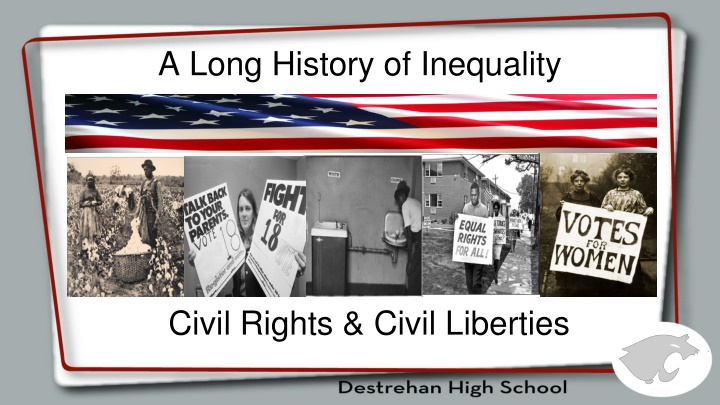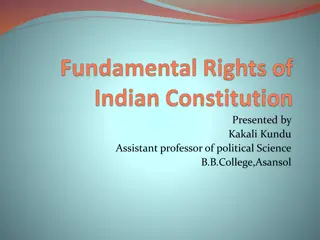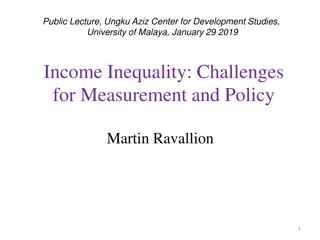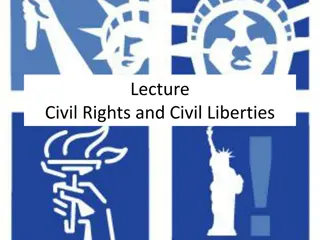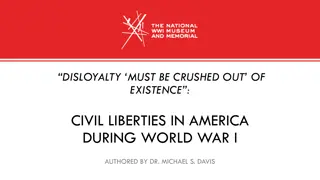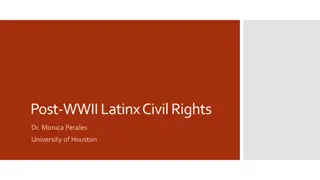A Long History of Inequality. Civil Rights & Civil Liberties.
Explore the complex history of inequality in the United States, from the Civil Rights and Civil Liberties amendments to the Reconstruction era. Learn about the limits placed on government, the significance of the 14th Amendment, and the challenges faced during the Reconstruction period, including the Black Codes. Dive into the evolution of rights and protections for all citizens throughout this transformative period in American history.
Download Presentation

Please find below an Image/Link to download the presentation.
The content on the website is provided AS IS for your information and personal use only. It may not be sold, licensed, or shared on other websites without obtaining consent from the author.If you encounter any issues during the download, it is possible that the publisher has removed the file from their server.
You are allowed to download the files provided on this website for personal or commercial use, subject to the condition that they are used lawfully. All files are the property of their respective owners.
The content on the website is provided AS IS for your information and personal use only. It may not be sold, licensed, or shared on other websites without obtaining consent from the author.
E N D
Presentation Transcript
A Long History of Inequality Civil Rights & Civil Liberties
Civil Liberties 1st-10th Amendments Civil Rights 13th, 14th, 15th, 24th Amendments, and Statutory Law, (Civil Rights Act, Voting Rights Act, etc.) These are limits placed on the government or things the government can t do. Substantive Liberties 1st, 2nd, 3rd, 9th, 10th Amendments These are often limits on states, majorities, or minorities in society, to guarantee equal protection from discrimination by those groups. (protection from tyranny of the majority or minority) These are limits on what the government can do to you during your daily life, such as the Establishment and Free Exercise clause in the 1st amendment. Procedural Liberties 4th, 5th, 6th, 7th, 8th Amendments These are limits on how the government can act once they must do something to enforce law against you, such as presumption of innocence and due process of law, right to an attorney, jury trial, etc.
Civil War or Reconstruction Amendments 13thAmendment-abolished slavery (1865) 14thAmendment-equal protection and birthright citizenship for freed slaves (1868) 15thAmendment- voting rights for freed slaves (1870)
14th Amendment (equal protection clause) (1868) Section 1. All persons born or naturalized in the United States, and subject to the jurisdiction thereof, are citizens of the United States and of the state wherein they reside. No state shall make or enforce any law which shall abridge the privileges or immunities of citizens of the United States; nor shall any state deprive any person of life, liberty, or property, without due process of law; nor deny to any person within its jurisdiction the equal protection of the laws.
Reconstruction (1865-1877) Union armies occupy Southern states Radical Republicans pass laws to secure rights for freed slaves Armed enforcement of civil rights in the South and voting rights. President Andrew Johnson impeached for opposing Reconstruction
Black Codes (1865 & 1866) Laws passed by Southern states to restrict civil rights of freed slaves. Louisiana already had Code Noir since 1685. Peonage, Vagrancy, Convict Leasing Laws, Grandfather Clauses Peonage was a form of debt slavery utilized by southern states in which former slaves were loaned money by business owners, and did work to pay back the loan, but often had to borrow more, thus entering into a cycle of debt bondage. Vagrancy laws were passed to arrest anyone homeless, begging, or unemployed, often rounding up newly freed former slaves and forcing them into prison labor, such as convict leasing. Grandfather clauses were southern laws that allowed anyone to vote, if their grandfather voted in a past election. This eliminated freed slaves from voting.
Election of 1876 The United States presidential election of 1876 was one of the most disputed presidential elections in American history. Democrat, Samuel J. Tilden of New York outpolled Ohio's Republican, Rutherford B. Hayes in the popular vote, and had one vote short of majority with 184 electoral votes to Hayes' 165, with 20 votes uncounted in Florida, Louisiana, and South Carolina with each party reporting its candidate had won the state. A deal was struck to resolve the dispute: the Compromise of 1877. In return for the Democrats letting Hayes win the election, the Republicans agreed to withdraw federal troops from the South, and racist governments took over all Sothern states under Jim Crow Law.
This is America Video C. Gambino-Donald Glover Grammy Album and Song of the year 2018 Jim Crow Laws (1877-1965) State and local laws that enforced racial segregation in the United States. Jim Crow name originates from "Jump Jim Crow" black-face minstrel music (1832) Crows who ate crops were poisoned with whiskey-dipped corn to make them unable to fly and only jump around. Crows were then easily killed, many times using metal bars (rods called jimmies. aka. Today s crowbar used to jimmy open a lock) Jimmie and Crow became racist names. Video
Plessy v. Ferguson (1896) Resistance to Jim Crow hit a major point when in 1892, Homer Plessy sued to ride a white-only train from New Orleans to Covington. In four years, there was a landmark decision of the U.S. Supreme Court issued in 1896. It upheld the constitutionality of racial segregation laws, as long as the segregated facilities were equal in quality a doctrine that came to be known as "separate but equal". (segregation) video
19thAmendment (1920) The Nineteenth Amendment to the United States Constitution prohibits the United States and its states from denying the right to vote to citizens of the United States on the basis of sex.
Brown v. Board of Education (1954) Supreme Court case declaring (9-0) that state laws establishing separate public schools for black and white students were unconstitutional, overturning Plessy v. Ferguson. The Civil Rights Movement (1950 s-1960 s) Struggle for social justice and equal rights for African Americans, led by Rev. Dr. Martin Luther King Jr. Involved peaceful protest, marches, bus boycotts, restaurant sit-ins, speeches, etc. The Civil Rights Act of 1964 First proposed by John F. Kennedy, signed into law by Lyndon B. Johnson, it ended segregation in public places and banned employment discrimination on the basis of race, color, religion, sex or national origin.
24thAmendment (1964) Poll taxes made illegal (fees to vote no longer legal) The Voting Rights Act of 1965 Congress passed the Voting Rights Act of 1965 which aimed to increase the number of people registered to vote in Southern States where there was a record of previous discrimination against African Americans. Shelby County v. Holder Section 2 outlawed voter discrimination based on race. Section 4b identified areas requiring preclearance. (southern states) Section 5 required that Southern States could not change voting laws without "preclearance" from the Federal government, and banned literacy tests to vote. Section 10 once again makes poll taxes illegal, just as in the 24th amendment. The 26thAmendment (1971) Changed the voting age from 21 to 18.
